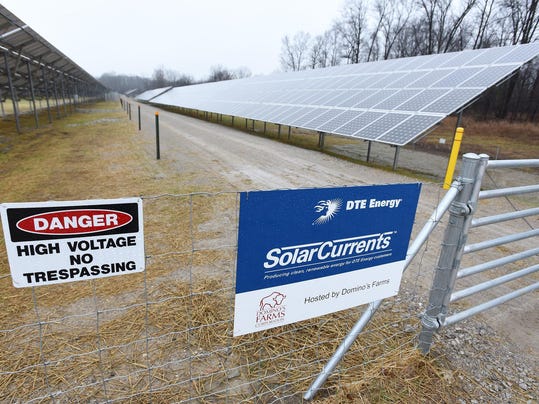Michigan electric providers would be required to produce at
least 30 percent of their energy from renewable sources by 2030 under a potential
ballot proposal organizers hope to put before voters this fall.
A group called Clean Energy, Healthy Michigan is preparing
to launch a petition drive this week for a statutory initiative designed to
increase development of solar, wind and other renewable energy sources.
Clean energy and environmental advocates lost a similar
fight in 2012, when utilities opposed and voters soundly
rejected a proposed constitutional amendment for a 25 percent
renewable requirement by 2025.
In an exclusive interview with The Detroit News ahead of the
new campaign’s launch, organizer John Freeman said he believes there is now a
stronger base of support.
“Our country and our state has taken significant steps
towards embracing renewable energy,” said Freeman, a former state legislator
and executive director of the Great Lakes Renewable Energy Association.
The committee intends to use a combination of paid and
volunteer circulators to collect at least valid 252,523 within a 180-day window
to make the November ballot. They’ll use initial funding from billionaire
environmentalist Tom Steyer’s NextGen America nonprofit, Freeman said.
A 2016 Michigan law signed by Republican Gov. Rick Snyder
requires that renewables must account for 15 percent of an electric provider’s
portfolio by 2022. The state first adopted a 10 percent by 2015 standard under
former Gov. Jennifer Granholm, a Democrat.
“The renewable portfolio standard has been an incredibly
successful public policy tool,” Freeman said, arguing the requirements have
helped create jobs, reduce costs, curb pollution and benefit public health in
Michigan.
The 2012 ballot campaign was an expensive
loss for clean energy advocates, who spent more than $14 million on
the effort but were outspent by opponents, including the state’s two largest
utilities, according to data compiled by the Michigan Campaign Finance Network.
DTE Energy of Detroit and Consumers Energy of Jackson
contributed a combined $24.1 million to a $25.3 million opposition campaign
that warned against writing an “artificial government mandate” into the state
constitution and argued it would increase electric bills.
Nearly two out of three voters opposed the measure, which
was defeated 62 to 38 percent. Voters rejected five other proposed
constitutional amendments that year and overturned the state’s emergency
manager law that legislators quickly replaced.
The new proposal would write the renewable requirement into
law rather than the constitution.
Freeman said organizers have had “cordial” conversations
with DTE and Consumers but acknowledged “they don’t necessarily agree with us
that the renewable portfolio standard is the way to go.”
But he argued that increasing required renewable generation
would provide “market certainty” for utilities while continuing to drive down
costs of renewable technology for customers.
The renewable energy requirement would increase to 18 percent
by 2022, 21 percent by 2024, 24 percent by 2026, 27 percent by 2028 and 30
percent by 2030.
Like the 2012 version, the new proposal would cap resulting
rate increases by electric providers. Utilities could not charge residential
customers more than an average of $2 per month to implement the renewable
standard.
Electric providers could use municipal solid waste or
landfill gas to reach the renewable requirement, but energy derived from pet
coke, scrap tires, coal waste or other hazardous waste would not qualify.
The Board of State Canvassers is set to consider the
petition Tuesday. If approved as to form, organizers plan to begin collecting
signatures immediately.


No comments:
Post a Comment